Brief

한눈에 보기
- US companies show significant confidence in the UK as a place to do business, both now and in the future.
- US investors show concern over uncertainty around UK-EU relations, particularly for companies with supply chains and business operations across the continent.
- Key priorities for US investors in the UK include better relations with the EU, a US-UK Free Trade Agreement, more clarity around the UK industrial strategy, and a business-friendly tax policy.
"This important study from BritishAmerican Business and Bain & Company, of major US corporations’ confidence in the UK as a place to invest and do business, reconfirms the UK’s position as a major global business hub. There is still some work to do to optimise the trading relationship between the UK and its neighbours in the EU, but the UK’s fundamental strengths of location, skilled and educated workforce, legal and regulatory reliability, and pro-business culture mean it is no surprise that 60% of respondents are planning to increase their investment in the UK in the coming years."
BAB International Advisory Board Chairs: Anna Mars, president, Global Commercial Services, American Express; and Dan Glaser, president and CEO, Marsh McLennan
For well over a century, the US-UK economic relationship has been a success story. Thousands of US companies, large and small, call the UK home. Their activities are a major component of the UK economy as they proudly provide services and produce goods in every nation and region of the UK. Everywhere, thousands of people have jobs, and entire communities a future, because of this activity.
As the UK recovers from the Covid-19 crisis and prepares to define its economic future as an independent trading nation, the US investment community will play a crucial role in the UK’s future success.
It is, therefore, timely that BritishAmerican Business, in partnership with Bain & Company, has produced the first edition of a Transatlantic Confidence Index, measuring US confidence in the UK as a place to do business.
Sixty-eight major US companies responded to the survey. Together, they represent more than 3,500 years of activity in the UK and employ more than 275,000 people. These businesses represent the whole range of leading UK sectors, such as financial services, technology, media and telecommunications, life sciences and healthcare, professional and legal services, logistics and transport, manufacturing, hospitality, energy, and consumer goods. Companies that responded to the survey are based in all four nations and major regions across the UK.
The survey measures overall confidence in the UK as a place to invest in and trade with, the anticipated prospects for investing in UK operations over the next two to three years, and the overall health of the UK’s relationship with its most important partners, the US and the EU. We also asked for thoughts on the UK as a hub for innovation, on the City of London as a global financial centre, and on the UK’s most attractive—and unattractive—assets.
Confidence high, despite challenging times
Despite the overall challenges brought by the Covid-19 pandemic and the adjustments that US businesses have had to make due to the UK’s departure from the EU, US companies active in the UK show strong confidence in the UK as a place to do business. On a scale of 1 to 10, the majority of US companies rate their confidence as 7 or higher, with an average confidence rating of 7.8 and about one-third of respondents rating their confidence at level 9 or 10.
In addition, the majority of US businesses surveyed for the study plan to expand their investments in the UK. About 60% of respondents plan to increase their investment in the UK over the next two to three years (see Figure 1).
US companies report high levels of confidence in the UK as a place to invest and do business

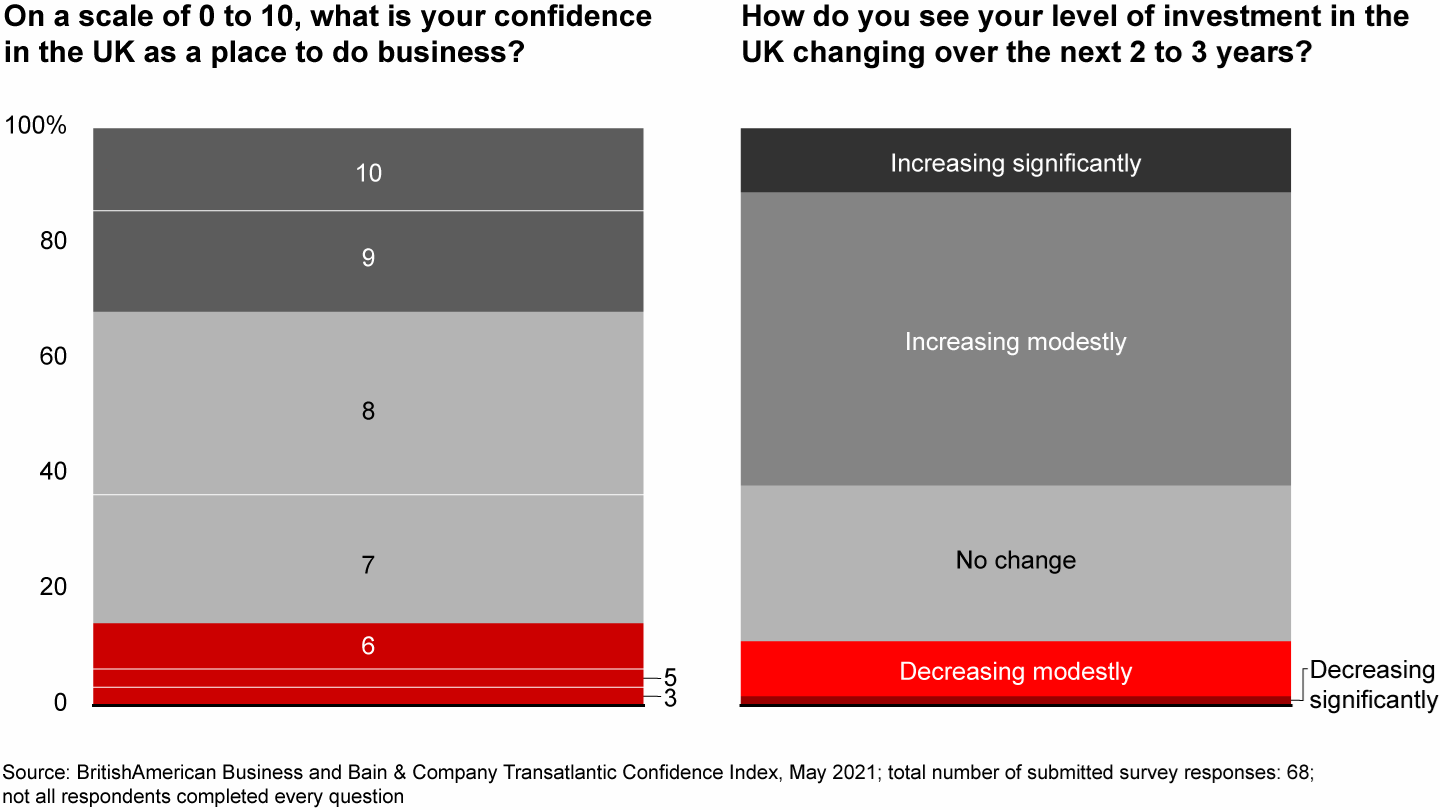
Leading factors that contribute to such a high confidence rating include attributes that have long characterised the UK’s international standing among US companies: a stable and predictable regulatory and legal environment and the quality of environmental, labour, and planning regulations. The country’s talent pool is also a draw, as well as the first-class academic research environment, which underpins a strong science and technology ecosystem.
Regulatory certainty earns the top spot, with 41 respondents rating it as an attractive asset for the UK. Labour, environmental, and planning regulations are also considered beneficial by half those surveyed. And about one-third of respondents favour the UK’s research and development (R&D) incentives and visa system. The tax environment and grant and loan support round out the top assets.
Respondents give high marks to the UK for being pro-business culturally, politically, and economically. As a society that welcomes students and business professionals from around the world, those surveyed view the UK as promoting advancements in both academics and business.
Despite recent turbulence, respondents still view the City of London as a hub for world-class financial and tech services, with an average response of 7.2 on our 10-point scale from all respondents. Financial sector companies give a slightly higher 7.4 rating. Expertise, experience within the insurance industry, and excellence in professional services, tech, and education are some of the reasons given for these high ratings.
Another point of confidence is the UK’s ability to perform as a hub for innovation. Across all respondents, the average confidence rating for this statement is 7.5 out of 10. Strong R&D incentives, a government focus on life sciences, forward-leaning regulation, and a willingness to be agile and flexible are all reasons for satisfaction and confidence.
The UK’s relationship with its main trading partners
Despite the ongoing transatlantic tensions around tariffs and digital taxation, among other issues, US companies view the transatlantic business corridor rather favourably, bestowing a grade of 7 (of 10) to the US-UK relationship (see Figure 2). This result clearly represents the strength of the transatlantic corridor, with the US being by far the largest source of foreign direct investment in the UK.
In contrast, however, this confidence level drops to 5 regarding the UK’s relationship with the EU. Nearly 80% of respondents reported a confidence score in the UK-EU relationship of 6 or lower, compared with only 20% for the US-UK relationship. No respondents rated the UK-EU relationship above an 8.
US companies are more concerned about the health of the UK–EU relationship than the health of the US–UK relationship

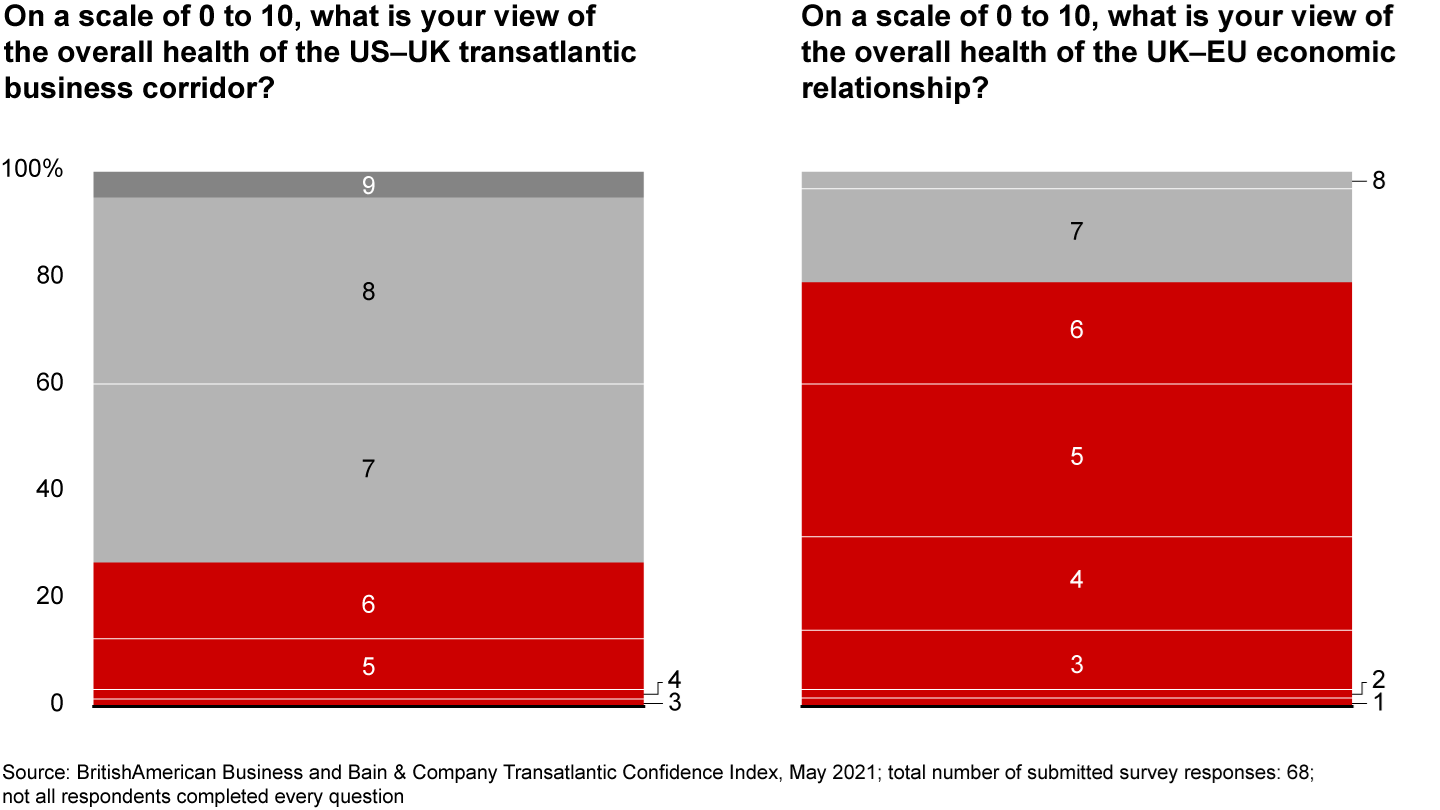
This result is remarkable, given that the UK-EU relationship is a key interest for US businesses with operations in the UK.
Survey respondents said the UK’s departure from the EU has resulted in new barriers to trade, specifically an increase in customs bureaucracy, which slows down supply chains. Lingering uncertainty around the UK-EU relationship is a big concern for US businesses, especially as political and trade tensions remain unresolved. In particular, they worry around their ability to access talent from the EU. An increase in other nontariff and regulatory barriers, losing the ability to perform certain services in the EU, and tariffs were also listed as impacts (see Figure 3). Combined, the survey results show that US companies are much more concerned about the UK-EU relationship than they are about the US-UK relationship.
Interestingly, despite initial worries that the UK’s departure from the EU would lead to a wave of relocations of key staff to other parts of the world, US companies report that the personnel impact has been relatively limited to date. While still notable, only 17% of all US companies surveyed reported a decrease in their headcount, and that decrease has largely been very modest.
US businesses rate “red tape” and talent recruitment as biggest concerns after the UK’s exit from the EU

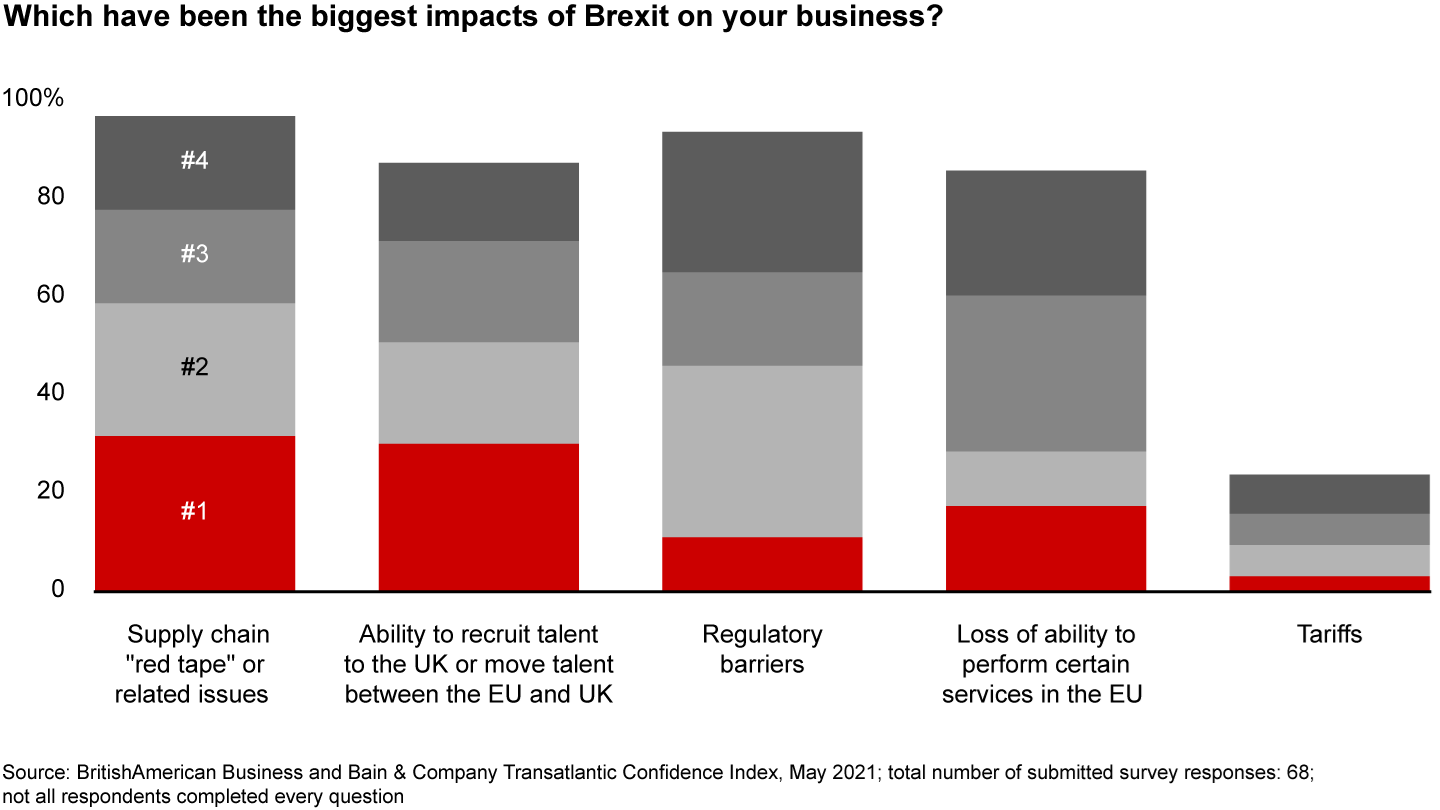
Prioritise relations with the EU and a US-UK Free Trade Agreement
Given these results, improving the political and economic relationship with the EU is understandably the top priority should the UK want to continue its top ranking as a destination for US investment. Nearly 40% of all surveyed companies named this as their No. 1 priority (see Figure 4).
For US businesses in the UK, relations with the EU take top investment priority

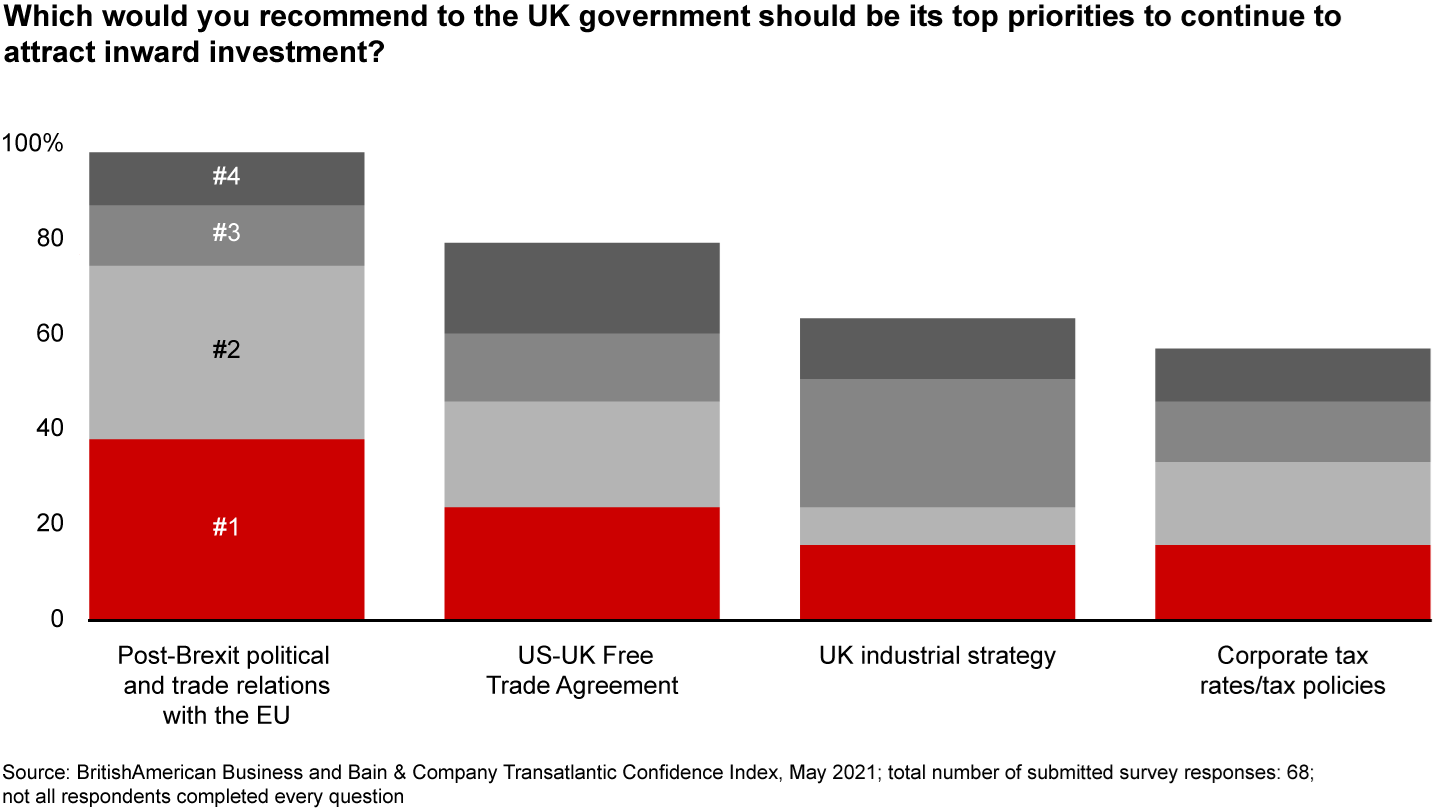
In addition, even though―or because―the current negotiations for the US-UK Free Trade Agreement have been paused since the arrival of the new US administration, concluding the negotiations has been listed as the second-most-important priority.
Other top recommendations are providing greater clarity around the UK’s industrial strategy and maintaining a business-friendly corporate tax environment. Life sciences and healthcare companies show the most interest in the industrial strategy, and comments are positive on the UK government’s recent focus on R&D and a willingness to be agile and flexible, in contrast to a historically slower uptake of innovation in the health service.
Confidence now and in the future
Our inaugural BritishAmerican Business and Bain & Company Transatlantic Confidence Index presents a positive baseline for assessing the UK’s business environment, both now and in the future.
Overall, the UK instils confidence as a stable business environment with no signs of erosion visible at this point. The data indicates that US companies remain confident in the UK as a place to do business and continue to see it as an attractive destination for their investments.
Yet, whether the UK can continue to receive such a level of confidence may depend on its ability to improve the political and economic relationship with the EU, to secure a trade agreement with the US, and to create a new, unique, and attractive profile as a destination for foreign investment.

US Companies Have Confidence in the UK
Despite uncertainty over UK-EU relations, US companies like doing business in the UK.
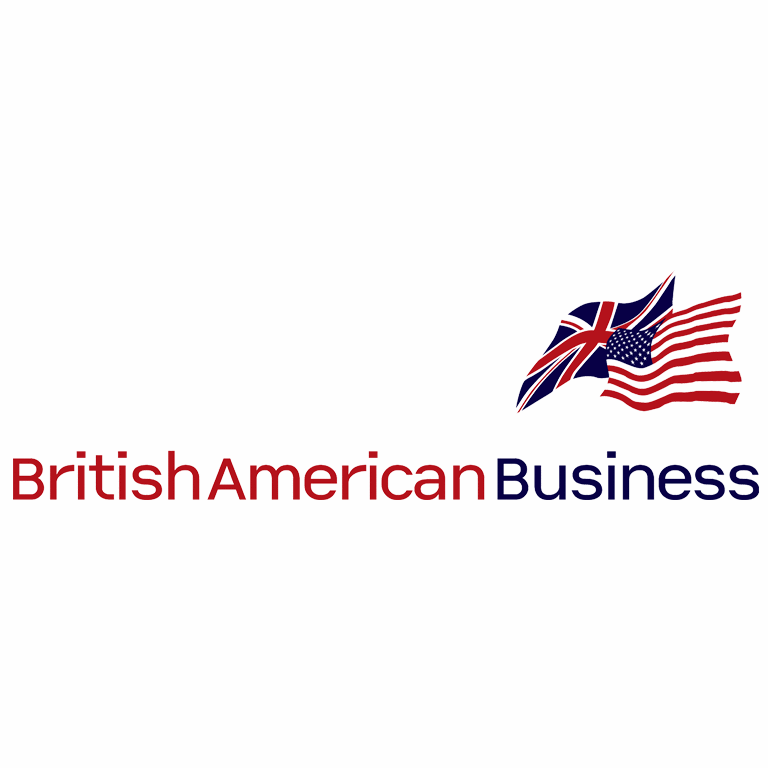
About BritishAmerican Business
BritishAmerican Business is the leading transatlantic trade association created as a result of the merger between the British-American Chamber of Commerce in the US and the American Chamber of Commerce in the UK. We are committed to strengthening the economic corridor between the United States and the United Kingdom by supporting policies and actions that protect and enhance the environment for transatlantic trade and investment on behalf of our members. We convene and serve a growing network of companies and business leaders through networking opportunities, bespoke programming and marketing platforms. We actively promote trade and investment and support those who make the transatlantic corridor part of their business growth ambition.